In July, Flensburger Schiffbau-Gesellschaft celebrated its 150th anniversary. Thanks to the financial commitment of investor Lars Windhorst, the employees are hoping for a secure future.
The recent times behind Flensburger Schiffbau-Gesellschaft (FSG) have been characterised by little optimism. On the contrary, a mood of crisis has dominated the last few years and the traditional company has been on the brink of collapse on several occasions. However, the old shipyard on the fjord draws strength from its location opposite the Mürwik naval school, its location within sight of an ancient harbour and, in particular, from its staff, the strong ties that have long existed with the men and women who work here and the associated integration into the society of the fjord town. Finally, the unshakeable North German mentality that bad weather should be met with appropriate clothing and that complaining is not an option. But the shipyard has always been able to hold its own in the market, establish itself as a specialist and carry innovation as a guiding principle in its heart. In the end, the Flensburg-based company was the world market leader for Ro-ro and Ro-pax ferries, but these were eventful times. There were many owners: In the nineties, it was the Oldendorff shipping company from Lübeck, later the Norwegian Siem Group. These ups and downs led to insolvency in 2020. There were probably many reasons. There were planning errors, supplier problems and, of course, the global market in general. Tennor Holding, owned by investor Lars Windhorst, has now been the owner since 2020.
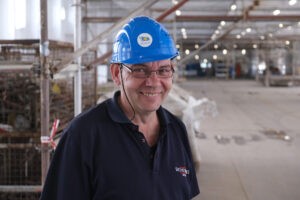
FSG employees are optimistic about the future
This is not the only reason why Flensburger Schiffbau-Gesellschaft (FSG) celebrated its 150th anniversary on 2 July. Ships have been built since 1872 and a total of 750 cargo, passenger and special ships have been sent out into the world from the fjord. From sailing schooners to submarines, freighters, container ships and ro-ro ferries, everything was there. Fleet service boats, hulls and superstructures of tenders and task force supply vessels were built for the navy. Even research vessels left the halls on the western shore of the inner fjord. For decades, people would gather on the eastern shore opposite the shipyard to watch ships glide into the water amid the howling of typhoons: The pupils of the schools on the eastern shore were sometimes given a free lesson - often without the knowledge of their teachers.
Sometimes it was "the end", but a solution was always found, such as in 2019 when Tennor Holding, owned by investor Lars Windhorst, stepped in. When insolvency proceedings were filed in 2020, several companies belonging to Tennor took over the shipyard and its 350 employees. The new start seemed successful, but there were still no orders. In the meantime, a lot has happened, and after the critically scrutinised economic restart, the new 782 was launched. The first launch on 17 June was a 210-metre-long ro-ro ferry, which was christened MV Tennor Ocean by Flensburg's Lord Mayor Simone Lange as godmother. The client is IVP Ship Invest, a company belonging to Lars Windhorst's Tennor Group. Negotiations regarding the sale or chartering of the ferry have not yet been finalised. The ship has four decks, can accommodate lorry trailers over a length of 4000 metres, requires comparatively little fuel and has a modern loading concept. The type was developed by FSG and has already been built several times - it is the Ro-ro type 4100. Commissioning is due to take place in the summer and the trial run in the autumn. In the meantime, external orders have been placed again, also in co-operation with the Nobiskrug shipyard in Rendsburg, which was also taken over by the group around Windhorst.
Around 2000 guests gathered at the shipyard site at the beginning of July. Employees, families and prominent visitors had the opportunity to take a close look at the facilities and trades - and also to view the new Tennor Ocean.
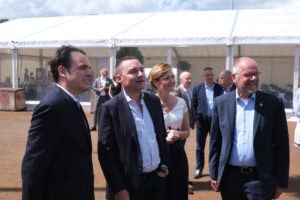
Phillip Maracke, Lars Windhorst, Simone Lange and Flensburg's mayor Hannes Fuhrig (from left)
No end in sight
Optimism was also evident in the celebratory speeches. Managing Director Philipp Maracke, Managing Director of Flensburger Schiffbau-Gesellschaft, recalled the history of the shipyard, its tradition, its ups and downs and its strengths. There have been rough seas in recent years, but "things are clearing up", he emphasised. He sees three major opportunities for the shipyard in the future: firstly, the cooperation with Nobiskrug in yacht building, secondly, the innovative strength in reducing pollutants and thirdly, naval shipbuilding. With regard to the latter, he alluded to the fact that the navy will benefit from the 100 billion package for the German armed forces and has orders to award.
The company will also be bidding for the construction of the research vessel Polarstern II. "The construction of naval vessels has always played a role in FSG's 150-year history. The largest ship in the German Navy was built here. The three fleet service boats currently in service were also developed and built here, as were the tenders," he explained. "The navy plays an important role in our future strategy." According to Maracke, the shipyard has always played a major role in Flensburg's society and ships will still be built here in 150 years' time. Flensburg's Lord Mayor Simone Lange was also a guest at the anniversary celebrations. "This shipyard has survived the past 150 years because it has always moved with the times and focused on quality and specialisation. That's why it has a future!" she said. She called on those present from the world of politics to take this message to Berlin.
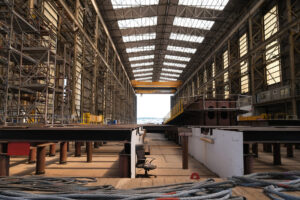
The large hall at the fjord is ready for the next project
"You can't beat China alone"
Dr Reinhard Lüken, Managing Director of the German Shipbuilding and Ocean Industries Association, said to Lars Windhorst that he had "taken on an old lady" and emphasised tradition and self-confidence. In his usual clearly critical tone, he pointed out the challenges: exploding prices, the cost of inflation and constant price pressure from China were also addressed as words of warning to politicians. "China cannot be beaten alone, politicians must help," he said clearly. Europe has its own needs and is the largest domestic market in the world, and new opportunities are arising from the requirements for climate neutrality. 20,000 ships need to be converted, tankers need to be built for hydrogen and new markets need to be opened up. Equipping the German Armed Forces is also a great opportunity. Perhaps it helps, said Lüken, that there are many northern Germans in the federal government, alluding to Chancellor Olaf Scholz and Economics Minister Robert Habeck, among others.
"Turning point also means timely!"
Lars Windhorst expressed his great respect for tradition and emphasised that, as an entrepreneur, he was used to taking risks. Using the examples of LNG and scrubber technology, he emphasised the innovative strength of the shipyard, although his face did not brighten when it came to LNG. All the more so, however, in his outlook for positive news: He announced new investments, including the acquisition of the floating dock of the Pella Sietas shipyard, avoiding the word insolvency estate. He also announced a co-operation in the processing of orders with the Nobiskrug shipyard and advertised for marine orders. With the available experience and capacity, it would be possible to start immediately. "A turnaround also means: promptly!" he said confidently. He had previously made a clear commitment to the employees: "You can rely on me!"
Holger Schlüter


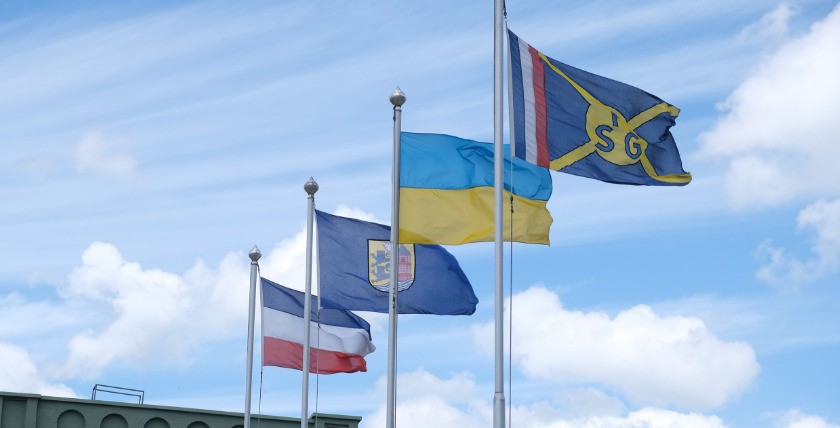






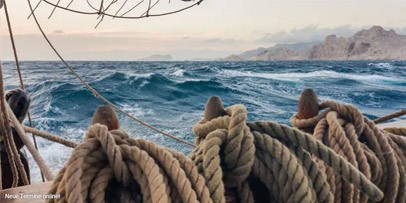

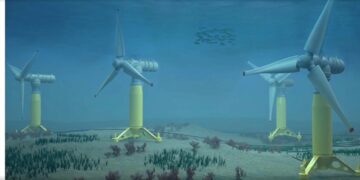
0 Kommentare